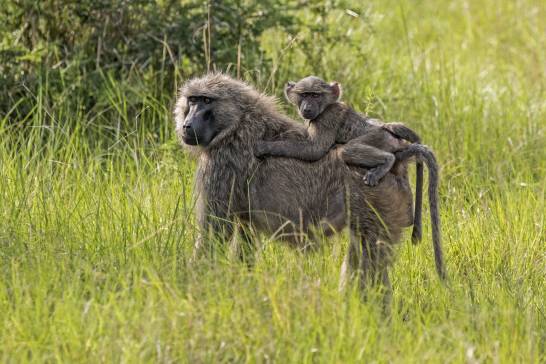An international study co-directed by Spanish researchers sequenced the genome of 809 primates and revealed a new way to find genetic mutations responsible for many human diseases, including heart disease and several types of cancer. The results helped create a clinically relevant artificial intelligence algorithm to identify the genetic causes of human disease using genomic data from primates.
The work, published in a set of five studies in a special edition of the magazine Science, provides new information on the genetic diversity and phylogeny of primates, which is important for understanding and conserving the diversity of species closer to humans.
“Humans are primates. The study of hundreds of genomes of non-human primates, given their phylogenetic position, is very valuable for evolutionary studies, to better understand the genome and the bases of our uniqueness, including the bases of human diseases, and for its future conservation”, points out Tomás Marques-Bonet, ICREA researcher at the Institute of Evolutionary Biology (CSIC-UPF) and professor of Genetics at Pompeu Fabra University (UPF) who co-directed the study. Researchers from 24 countries collaborated on the study.
The study of hundreds of non-human primate genomes is very valuable for evolutionary studies, to better understand the genome and the bases of our uniqueness.
The study combined the sequencing of primate genomes from 233 species, spanning nearly half of all primate species on Earth, including the study of fossil remains and multiplying by 4 the number of primate genomes available so far. The genomes of 86% of the genera and all primate families have been revealed. Of these, eight out of ten were sequenced at the National Center for Genomic Analysis (CNAG) in Barcelona.
A genetic ChatGPT
One of the limitations of human and clinical genetics is the current inability to detect, among hundreds of thousands of mutations, those that cause disease. The genetic causes of many common diseases, such as diabetes and heart disease, due to lack of genetic information or the large number of genetic factors involved. Some diseases are believed to arise when a set of genetic variations or mutations with a “soft” effect work together to cause a disease of polygenic origin, such as diabetes or cancer.
When comparing the genome of non-human primates with the human one, the research identified 4.3 million mutations they affect amino acid composition and can alter the function of proteins (the basic molecular building blocks of life). These mutations identified in primates are the basis for carrying out
comparative studies with human variants and identify these key variants in many human diseases.
“6% of these mutations are abundant in primates and, therefore, are considered “potentially benign” in human diseases, since their presence in these animals is tolerated”, he says. Kyle FarhVP of Artificial Intelligence at Illumina and co-senior author of the posts.
6% of these mutations are abundant in primates and are therefore considered “potentially benign”
Identification of disease-causing mutations was achieved thanks to the PrimateAI-3D deep learning algorithm. An artificial intelligence (AI) algorithm developed by Illumina, the world’s leading DNA sequencing company, which is a kind of ChatGPT for geneticsthat uses the genome sequence instead of human language.
New insights into human uniqueness
The publication of this project contains the most comprehensive catalog of primate genomic information produced to date, covering nearly half of all primate species on Earth. Contains primate information from Asia, America, Africa and Madagascar.
These studies also indicated that primate genetics do not always match their taxonomy. There are cases in which relationships between primate species are described more as complex networks than simple tree branches.
Another study investigates the evolution of baboons, a large and diverse group of apes, showing that there have been several episodes of hybridization and gene flow between species not previously recognized. Furthermore, the researchers showed that yellow baboons of western Tanzania they are the first non-human primates to receive genetic contributions from three different lineages.
“These results suggest that the genetic structure of the population and the history of introgression among baboon lineages are more complex than previously thought, demonstrating that baboons are a good model for the evolution of humans, Neanderthals and Denisovans,” he says. Jeffrey Rogersassociate professor at the Center for Human Genome Sequencing and Department of Molecular and Human Genetics at Baylor College of Medicine, who co-led this study.
The genetic structure of the population and the history of introgression among baboon lineages are more complex than previously thought.
“Our studies provide clues about which species are most urgently in need of conservation efforts and can help identify the most effective strategies to preserve them,” he says. Lucas Kudernafirst author of one of the studies.
Finally, the new genomic catalog halved the number of genomic innovations once thought to be uniquely human. this remark
it facilitates the identification of those mutations not shared with primates that, consequently, may be unique to human evolution and the characteristics that make us human.
IBE and UPF researchers Lukas FK, Kuderna, Alejandro Valenzuela, David Juan, Arcadi Navarro and Esther Lizano also participated in the studies grouped in this special issue of Science.
The other special edition consortium, co-led by Guojie zhangof Zhejiang University, and Dong-dong Wu of the Kunming Institute of Zoology, in collaboration with IBE, performed comparative genomic analyzes of the reference genomes of 50 primate species, including humans, and also contributed four other articles to this issue. Special.
These articles focus on genomic evolutions and provide new insights into the process of speciation in primate species, the genomic innovations related to human uniqueness and the social evolution of primates.
References:
Kuderna, LFK et al., ‘A global catalog of the genome-wide diversity of 233 primate species’ Science. May 2023.
Sorensen, E, et al., ‘Genome-wide coancestry reveals details of ancient and recent male crosslinking in baboons’ Science. May 2023.
Gao, H, et al., ‘The landscape of tolerated genetic variation in humans and primates’ Science. May 2023.
